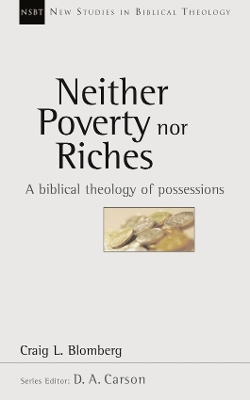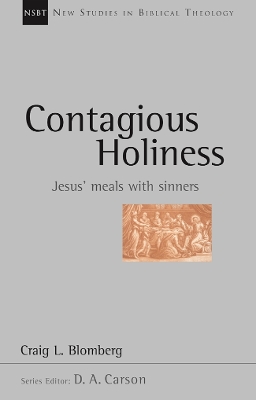New Studies in Biblical Theology
1 primary work • 2 total works
Book 7
In wealthy nations such as Britain and the USA, individuals accumulate much and yet are daily exposed to the plight of the poor, whether the homeless on their own city streets or starving children on their TV screens. What action should they take on behalf of the poor? What should they do with their own possessions? In Neither Poverty nor Riches Craig Blomberg asks what the Bible has to say to these issues. He avoids easy answers, and instead seeks a comprehensive biblical theology of possessions. Beginning with the groundwork laid by the Old Testament and the ideas developed in the intertestamental period, he draws out what the whole New Testament has to say on the subject and finally offers conclusions and applications relevant to the modern world.
One of humanity's most basic and common practices - eating meals - was transformed by Jesus into an occasion of divine encounter. In sharing food and drink with his companions, he invited them to share in the grace of God. His redemptive mission was revealed in his eating with sinners, repentant and unrepentant alike.
Jesus' 'table fellowship' with sinners in the Gospels has been widely agreed to be historically reliable. However, this consensus has recently been challenged, for example, by the claim that the meals in which Jesus participated took the form of Greco-Roman symposia - or that the 'sinners' involved were the most flagrantly wicked within Israel's society, not merely the ritually impure or those who did not satisfy strict Pharisaic standards of holiness.
In this excellent and thorough study, Craig Blomberg engages with the debate and opens up the significance of the topic. He surveys meals in the Old Testament and the intertestamental period, examines all the Gospel texts relevant to Jesus' eating with sinners, and concludes with some contemporary applications.
Jesus' 'table fellowship' with sinners in the Gospels has been widely agreed to be historically reliable. However, this consensus has recently been challenged, for example, by the claim that the meals in which Jesus participated took the form of Greco-Roman symposia - or that the 'sinners' involved were the most flagrantly wicked within Israel's society, not merely the ritually impure or those who did not satisfy strict Pharisaic standards of holiness.
In this excellent and thorough study, Craig Blomberg engages with the debate and opens up the significance of the topic. He surveys meals in the Old Testament and the intertestamental period, examines all the Gospel texts relevant to Jesus' eating with sinners, and concludes with some contemporary applications.

